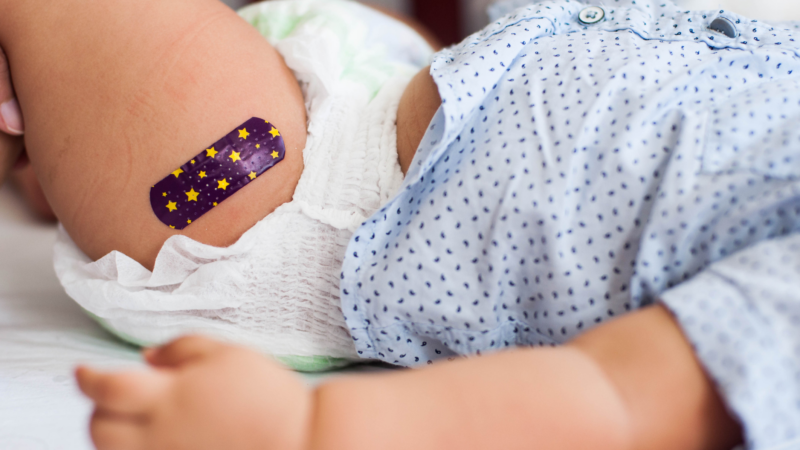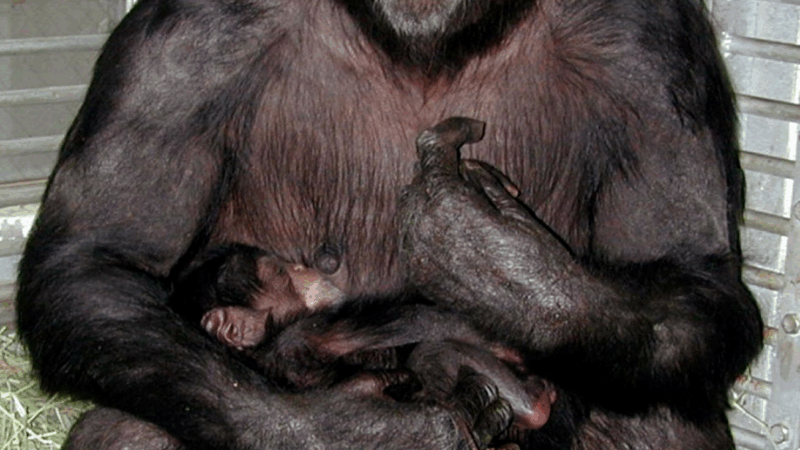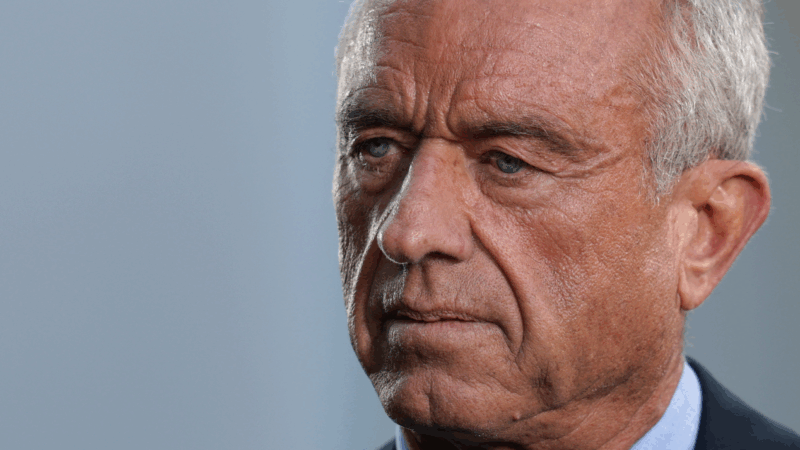As measles cases rise, some parents become vaccine enthusiasts
As a measles outbreak in West Texas and New Mexico continues to grow, and other states report outbreaks of their own, some pediatricians across the U.S. say they are seeing a new trend among concerned parents: vaccine enthusiasm.
“Our call center was inundated with calls about the MMR [measles, mumps, rubella] vaccine,” says Dr. Shannon Fox-Levine, a pediatrician in Broward County, Fla. She says parents are asking if their child is up to date on their vaccinations. Or “should they get another vaccine? Should they get an extra one? Can they get it early?”
Measles spreads quickly in communities where vaccination rates are low, and vaccine hesitancy has been on the rise across the U.S. in recent years. Kindergarten vaccination rates have not bounced back to their pre-pandemic levels.
Fox-Levine says the recent interest in the MMR vaccine — which protects against measles, mumps and rubella — is a refreshing change in a state where vaccine hesitancy has been growing.
Florida’s kindergarten vaccination rates to protect against measles fell to 88.1% in the 2023-2024 school year — below the 95% vaccination rate considered necessary to protect against outbreaks. So, seeing a demand for vaccines is “exciting,” she says.
Five U.S. states are currently experiencing measles outbreaks — New Mexico, Kansas, Ohio, Oklahoma and Texas, which has the most cases by far, with 400 confirmed cases as of Friday. So far this year, the U.S. has reported more than 480 measles cases in 20 states. That’s more cases than in all of 2024. Almost all of the cases are in people who were not vaccinated.
Parents are watching what’s happening with these outbreaks and concern about potential exposure is growing. Before the measles vaccine was developed in the early 1960s, the disease used to kill hundreds of people in the U.S. every year.
In Southern Pines, N.C., pediatrician Dr. Christoph Diasio says he’s had many conversations in recent weeks with families who are interested in getting their children vaccinated against measles earlier than what’s usually recommended.
The first dose of the MMR vaccine is usually given between 12 and 15 months of age, with a second dose administered between the ages of 4 and 6 years. The Centers for Disease Control and Prevention says infants as young as 6 months old can receive the MMR vaccine if they are traveling abroad or are in an outbreak area.
Diasio says families with children younger than 12 months are requesting the shot early, especially if they have travel plans for spring break.
“Several families have asked what our game plan is if we get measles in our community,” Diasio says.
In some cases, Diasio says, his patient families have delayed travel plans until their children are old enough to receive the MMR shot.
“The main thing I’m hearing from my patients is not, ‘Oh, my gosh, I’m so scared of that measles vaccine. It’s more like, can I have one? Should I get an extra?” Diasio says.
He says one mother he spoke with recently was worried about the potential that unvaccinated relatives could contract measles while flying cross-country to visit her. “It’s awful that this is now a discussion we have to have,” Diasio says.
Interest in vaccinations has ramped up ahead of the spring break travel season, says Dr. Susan Sirota, a primary care pediatrician in the Chicago area.
“We have many patients calling us because they are traveling to either Texas or places near Texas, or states where they suspect that vaccination rates are lower than we have in Illinois,” Sirota says. “Many families are requesting early MMR [vaccines].”
While the measles outbreaks are driving interest in vaccinations, Sirota says they’re not the only factor at play. She says many families she works with follow the news, and they worry that vaccines may become less accessible in the future now that Robert F. Kennedy Jr., a longtime critic of vaccines, is the head of the Department of Health and Human Services.
“What I’m seeing is that there’s a bit of fear among moms and dads and parents about their ability to protect their children and to prevent diseases because vaccine access is in question for them,” Sirota says.
And it’s not just the measles vaccine. Sirota says some patients are worried about access to the HPV vaccine, which protects against human papillomavirus. HPV is best known for causing cervical cancer, but can also cause other malignancies, including cancer of the throat and anus. Kennedy has been involved in legal challenges to that vaccine.
During his Senate confirmation hearing, Kennedy said he wouldn’t take vaccines away from anyone. He has called vaccines a personal choice. NPR reached out to HHS for comment about their plans to maintain people’s access to vaccines. They did not respond.
It’s too soon to tell whether anecdotal reports of vaccine enthusiasm will help counter longer-term trends toward growing vaccine hesitancy. According to one 2024 study, 1 in 5 U.S. parents are now hesitant about vaccines.
And studying changes in these attitudes may be harder in the future: The National Institutes of Health has terminated millions of dollars worth of grants for research to study vaccine hesitancy and how to improve immunization levels.
Edited by Jane Greenhalgh
Transcript:
AILSA CHANG, HOST:
Measles is now spreading in five states – Texas, New Mexico, Kansas, Ohio and Oklahoma. Most of the cases are in West Texas, which reported today that they have had 400 cases since the outbreak started. Measles spreads quickly in communities with low vaccination rates, and vaccine hesitancy has been on the rise for years. But now, some pediatricians are seeing vaccine enthusiasm. NPR’s Maria Godoy is here to tell us more. Hi, Maria.
MARIA GODOY, BYLINE: Hi, Ailsa.
CHANG: OK, so what are the latest numbers we’re seeing right now on measles?
GODOY: Well, today, Texas reported 77 new cases just since Tuesday, which just goes to show how contagious measles is.
CHANG: Yeah.
GODOY: Yeah. Health officials there are expecting more cases, and as you noted, the virus is now spreading in other states. New Mexico has 44 cases. Kansas has 23. So there’s concern that the virus will keep spreading.
CHANG: And do most cases involve people who are not vaccinated?
GODOY: Correct. The vast majority are not vaccinated. But here’s something interesting. While we’re hearing a lot about parents who don’t want to vaccinate their kids, pediatricians I’ve been talking to are also hearing from worried parents who want their kids to get their vaccines early.
CHANG: What do you mean by early?
GODOY: So normally, kids get their first measles vaccine between 12 and 15 months and then a second dose between 4 and 6 years. But the CDC says in certain situations, you can get the measles vaccine as young as 6 months, like if you’re traveling abroad or are in an outbreak area. I spoke with Dr. Shannon Fox-Levine. She’s a pediatrician in Broward County, Florida.
SHANNON FOX-LEVINE: Our call center is – was inundated with calls about, you know, MMR vaccine. Is their child up to date? Should they get another vaccine? Should they get an extra one? Can they get it early?
GODOY: And this is in Florida, where vaccine hesitancy has been growing, so Fox-Levine says hearing vaccine enthusiasm is exciting.
CHANG: And why do you think there has been an uptick in enthusiasm?
GODOY: Well, two things – parents are watching what’s happening with these outbreaks, and they’re worried that measles will spread to where they live. You know, it is spring break season now, so people are traveling, and if you have kids who are too young for the vaccine, you might worry that you could run into someone with measles or that someone with measles could travel to your community. So these are the concerns pediatricians are hearing, but there’s also politics at play.
CHANG: What do you mean? Like, what kind of politics?
GODOY: Well, several pediatricians told me they’re hearing from parents who are worried about the future of vaccine access. These are parents who watch the news. They know that Health and Human Services Secretary Robert F. Kennedy Jr. has been a longtime critic of vaccines. Here’s Dr. Susan Sirota. She’s a pediatrician in the Chicago area.
SUSAN SIROTA: There’s a bit of fear among moms and dads and parents about their ability to protect their children and to prevent diseases because vaccine access is in question for them.
GODOY: And, you know, it’s not just the measles vaccine. Sirota says some patients are worried about access to the HPV vaccine, which protects against cervical cancer. Kennedy has been involved in legal challenges to that vaccine. Now, during his confirmation hearing, Kennedy said he wouldn’t take vaccines away from anyone. He’s called them a personal choice. We did reach out to HHS for comment. They did not respond.
CHANG: That is NPR’s Maria Godoy. Thank you so much, Maria.
GODOY: My pleasure.
Opinion: Remembering Ai, a remarkably intelligent chimpanzee
We remember Ai, a highly intelligent chimpanzee who lived at the Primate Research Institute of Kyoto University for most of her life, except the time she escaped and walked around campus.
The near death — and last-minute reprieve — of a trial for an HIV vaccine
A trial was about to launch for a vaccine that would ward off the HIV virus. It would be an incredible breakthrough. Then it looked as if it would be over before it started.
Bessemer data center developer to request rezoning for additional 900 acres
The city’s attorney informed council members of the request on Tuesday, warning that there may be media scrutiny.
Is RFK Jr.’s Administration for a Healthy America — AHA — in the works or not?
The Administration for a Healthy America is RFK Jr.'s plan to tackle chronic disease, addiction and other persistent problems. But so far it's not being set up like previous new agencies.
Major plumbing headache haunts $13 billion U.S. carrier off the coast of Venezuela
The crew of USS Ford is struggling to handle sewage problems on board the Navy's newest carrier.
They quit their day jobs to bet on current events. A look inside the prediction market mania
Prediction market apps are thriving in Trump's second term, with traders betting on migrant deportations to election outcomes. A community of young, mostly male and very online traders are driving the industry's bonanza.





